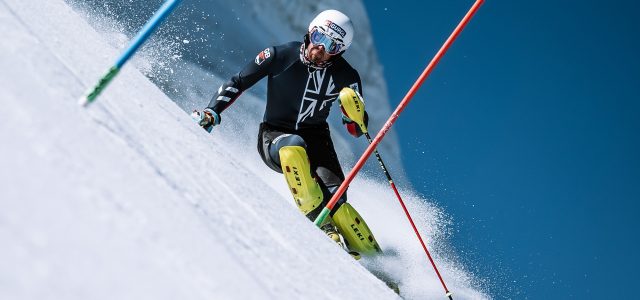
Dreams Made Better
Before Dave Ryding, no British skier had ever won a World Cup event in the entire 55 years of professional ski racing. Not only did he change that, he ended a close-to-a-century drought and put his name next to another remarkable individual, writes David Fearnhead
August 1940, and in the skies over Winchester the Battle of Britain is into its second month. One British pilot’s active war service is about to come to an early end. Blinded by fragments of his cannon-riddled canopy, he is forced to bail out. Squadron Leader Gordon ‘Mouse’ Cleaver survived. He required 18 operations, during which his surgeon found that the Perspex splinters which had lodged in his eyes, caused no inflammation. This discovery led directly to the invention of the first intraocular lens, which by 2020 had saved the sight of 32 million people.
Cleaver has another important note in history. For 91 years he was the only British skier to have won at Kitzbühel. For the uninitiated, Kitzbühel is what Wimbledon is to tennis, or the Old Course at St Andrews to golf. Its famed Hahnenkamm mountain is where legends are born.
Enter Dave Ryding. He’s not your average slalom skier. He’s originally from Bretherton, Lancashire – a place not noted for its alpine peaks. However, his is no Eddie the Eagle story. Despite humble beginnings on Pendle’s dry ski slope, Ryding had already established himself as a legitimate competitive skier.
“I think it shows if you are willing to sacrifice and put in the time, you can achieve a great deal. That’s the same for anything, not just skiing,” says the 35-year-old British skier. “I looked back at where I was ranked when I was 16, just for people born 1986 in Britain I was ranked 18/20. Never mind where I would have been ranked against Austria or France. I just loved skiing, so I persisted with it.”
His progression was one of incremental gains. Gradually getting to a position where he could go up against the best in the sport. Maybe even win a World Cup event one day. But there seemed too much stacked against him in January this year as he prepared for the World Cup Slalom. He was sick – suspected Covid, which turned out to be just regular flu, or ‘man-flu’ as he belittles it. He was also 35. Nobody wins a World Cup Slalom at 35 – and certainly not as a maiden winner.
Kitzbühel is a hard enough challenge on the best of days, but the weather was also against him. A snowstorm had blown in, and organisers brought the slalom forward to Saturday in order to give the downhill racers the clear weather on the Sunday. Normally, he’d hate skiing in a storm, but for some reason that day was different. There was a calmness about him.
“It’s still right there,” he says of the memory. “It’s more the emotion after the race. When you take the lead the time turns green in the finish area. That green light triggers a lot of emotion because you know you are winning even though I had five more to go after me. I just let out so much emotion because I knew I could at least finish sixth which is a good result.”
As his competitors followed, all failed to beat his time. Then it came down to one. Five years ago, the roles had been reversed. It was he who was at the top, in the start gate, the last man out to try and beat the legendary Austrian Marcel Hirscher’s leading time: “Now I was in Marcel’s shoes. The man at the bottom waiting for this 22-year-old Italian chap to have his go. I remember thinking it’s much better being the guy at the bottom.”
The Italian failed to beat his time, and with it a new name was added to the history books.
“I always used to say to the young skiers, it’s possible, you can win a World Cup. I don’t need to say that anymore. I’ve done it, and they’ve seen it with their own eyes. Nothing is more powerful than that.”
With wife, Mandy, who was a former ski-racer, he’s recently had a new baby, Nina. The couple run the acclaimed Boskin’s Cafe in Tarleton and despite juggling duties as a new father and business owner, he’s not done with the skiing yet.
“It’s taken me so long to get to the top I want to stay there. I’ve done six years ranked in the top 15, which surprises even me. I don’t think I’m quite done yet. More podiums and staying at the business end with the young guys is what I’m aiming at. Whether I can still be at the level I’m at for the next Olympics I don’t know. Nobody has ever done it before, but then nobody had ever won a World Cup event at 35 before.”

